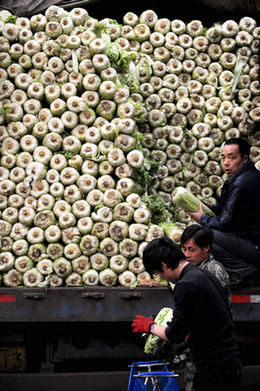Tougher year looms in 2012
Updated: 2011-12-06 07:09
By Xin Zhiming (China Daily)
|
|||||||||
A China Daily survey of economists indicates growth will slow down, Xin Zhiming reports in Beijing.
|
 |
|
What will macro-economic movements do to the price of Chinese cabbage? Even the experts can't agree about inflation, which is likely the single economic factor that average consumers encounter every day. [Photo / Xinhua] |
The bad news: 2012 will be even tougher.
China Daily surveyed numerous economists - all opinion leaders in Chinese economic studies - and while they differ on many topics, they seem to agree on one thing: The Chinese economy is set to slow down.
No one is sure how serious that slowdown might be, just as few anticipated that GDP growth in China, in the first quarter of 2009, would drop to slightly more than 6 percent (from its usual 10-plus percent) in the wake of the global financial crisis.
As one economist said, China risks a hard landing if the economies of the European Union and the United States are worse than expected and the country's property market slumps too fast.
Meanwhile, China faces other uncertainties, the survey found, including currency revaluation, local government debt, a weak capital market and the reduction of carbon emissions.
None of them will be easy to tackle, especially for policymakers who are preoccupied with the problem of growth.
China Daily surveyed economists about their expectations for China in 2012. Here are the questions, with two answers each from the experts.1. Will China face a hard landing next year?
Ardo Hansson, lead economist for China at the World Bank
China may face the risk of a hard landing if the European Union's and the United States' economies decline more than expected and the adjustment in the country's property market happens too fast. Such a likelihood, however, is small. And consumption, which is now the driver of China's economy, remains strong.
The World Bank has lowered its gross domestic product (GDP) growth forecast for China to 9.1 percent for this year and 8.4 percent for 2012, amid growing concerns about the effect of the European debt crisis on the world's second-largest economy.
I would be more cautious about the monetary loosening, because the consumer price index (CPI) has softened for two months and our forecast of 9.1 percent growth is still above the government's GDP target this year.
I would suggest the government stop the tightening measures for a while to see what happens next.
The World Bank estimated that China's inflationary pressure will ease further next year, predicting that CPI will grow 5.3 percent this year and 4.1 percent next.
Pan Jiancheng, deputy director-general of the China Economic Monitoring Analysis Center at the National Bureau of Statistics
I don't think China will encounter a hard landing next year because the slowdown in the economic growth is a result of the government's active adjustment.
As for the three key drivers for China's economic growth - investment, consumption and export - the first two sectors are not expected to see a big slide next year.
Meanwhile, the employment figure is also encouraging. From January to October, the employment of industrial enterprises with annual sales above 20 million yuan saw a growth of 9.2 percent, indicating a still strong growth momentum.
Moreover, we should strive for a growth in high quality instead of a growth only in speed.
2. Will inflation continue to calm down next year?
Sheng Laiyun, spokesman for the National Bureau of Statistics
China's inflationary pressure may have continued to fall in the last two months of this year, thanks to decreasing food prices. In addition, the downward movement of global commodity prices has helped tame soaring imported inflation. However, China may have entered into a long-run period of moderate inflation. In 2012, the nation's consumer prices may increase again because of increasing labor and energy costs. It is an inevitable stage of China's industrialization process.
Another factor that may fuel inflation next year is that some developed economies, such as the United States, are likely to continue their monetary easing policies to stimulate economic recovery, which means commodity prices are expected to go up as more liquidity is injected.
Peng Wensheng, chief economist with China International Capital Corp Ltd
Along with cooling economic growth, China's inflation is expected to decrease gradually next year. The consumer price index is forecast to be as low as 3 percent in 2012.
The main contributors to the soaring inflation in 2011 were cyclical factors, in that supplies couldn't satisfy market demands so prices were raised. The situation has changed now and it is clear that consumer prices are likely to further decline.
The easing of inflationary pressure will provide more space for policymakers to loosen monetary policy because maintaining a GDP growth rate of more than 8 percent is likely to be the top task of the government in 2012.











